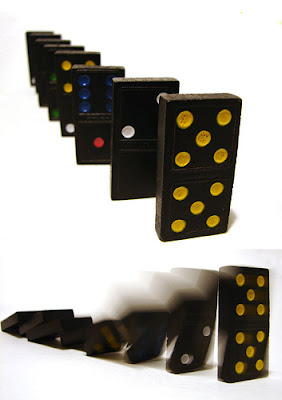 See explanations for other recent LSAT Logic Games.
See explanations for other recent LSAT Logic Games.This post is the first of a three-part series on sequencing rules in newer Logic Games.
Starting with PrepTest 51 (December 2006), LSAC threw a twist into sequencing games (a basic type of Logic Game). It added "conditional sequencing" rules. Conditional means "If...then."
This post will explain what I consider the easiest rule of this type.
Preptest 51, Game 2
Let's look at the 4th rule of the 2nd game in PrepTest 51. The game starts off, "Six hotel suites..."
4th rule of the game:
"F is more expensive than G, or else F is more expensive than H, but not both."
(Keep in mind one of the game's other limitations, which is that no two variables can occur simultaneously - they must all occur at different times.)
Although this doesn't appear to be a conditional rule at first, it actually is. If one of the two happens, the other one can't happen because the rule says "but not both."
It's difficult to hold a rule like this in your head, especially when there are other complex rules in the game.
Since there are only two possibilities, it makes sense to write them out. It's faster to look at the possibilities than to repeatedly translate what the rules actually mean.
Our letters in this rule are F, G, and H. Note that the game requires that no two variables (hotel suites) are the same price.
1st possibility:
Let's look at the first half (clause) of the rule: "F is more expensive than G."
Since the game ranks the hotel suites from most expensive to least expensive, we'll say that this means:
F - G
If F is more expensive than G, F can't also be more expensive than H (because it said "but not both").
This means H will have to be more expensive than F.
Therefore:
H - F - G
(H is more expensive than F, and F is more expensive than G)
2nd possibility:
Let's now look at the second half (clause) of the rule: "F is more expensive than H."
This means:
F - H
When F is more expensive than H, F can't also be more expensive than G (because it said "but not both"). This means G will have to be more expensive than F.
Therefore:
G - F - H
(G is more expensive than F, and F is more expensive than H)
The game will include either:
1. H - F - G
2. G - F - H
Write these at the bottom of the page.
Each valid scenario (ordering of the variables) will feature one of these possibilities or the other.
***
Read on for Part 2: Newer Logic Games: Before, After, But Not Both | PrepTest 52
Photo by aussiegall / CC BY 2.0



Is it a possibility, under scenario 1, that H costs the same as F?
ReplyDeleteIt's not possible. Make sure to read the rules carefully.
ReplyDeleteAs I said above, "Note that the game requires that no two variables (hotel suites) are the same price."
None of these games except the stones and gems one were difficult for me. But the chores games on motorbike cleaning was really tough. I kept feeling like am I so tired that I'm missing something?? Felt like one of the conditions was missing. I tend to do well on more difficult " games since they usu. have more constraints, deductions. Its the ones where you have to rethink your diagram or sequence that throw me like that one with the train schedules with five trains, and they can must run twice in each of three consecutive runs, but not three times in a row.
ReplyDelete--
Dino game was not dissimilar from toys game with color matching, dont know why it is in all the blogs. I had some trouble with it, but it finally clicked for me. If I get answers wrong it will be because i was super tired that day (no sleep from anxiety) and I was struggling to get my brain to work as fast as usual so i was behing in my pacing/timing. Had to pick and choose what q to answer, which i usu. dont have to do.
---
thanks for posting this blog.
waiting two + weeks to get your score is excruciating. by the second day i was already antsy, dying to know. stuff like this blog help me keep distracted.
---